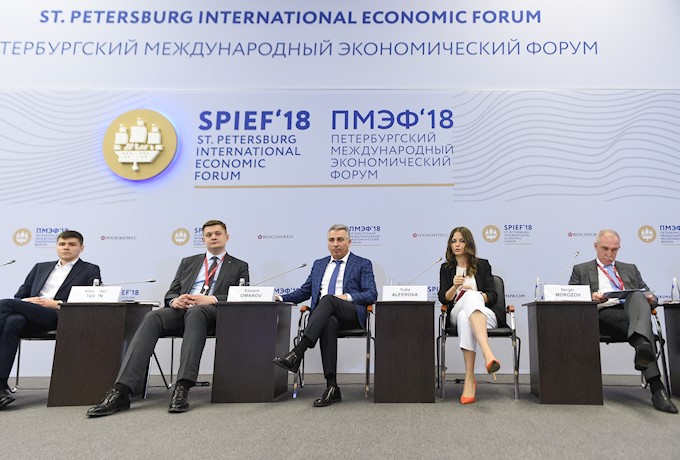
Young Entrepreneurship
Among the events taking place on 23 May 2018 – the eve of the St. Petersburg International Economic Forum – is the Russian Small and Medium-sized Enterprises Forum.
Included in the SME Forum programme was a panel session entitled ‘Young Entrepreneurship – Supporting the National Economy’. The session was moderated by Artem Androsov, Chairman of the Committee for Youth Entrepreneurship at OPORA RUSSIA. He noted that an ambitious objective faces the entrepreneurial community: to double the share that SMEs account for in the country’s GDP. Expressing the view that small businesses possess much untapped potential, Androsov noted how they are a source of economic growth. He explained the necessity of popularizing entrepreneurship, and of resisting the temptation to remain confined to the domestic market in order to make active inroads globally. The moderator invited speakers at the session to assess the current situation in the SME segment, and opportunities to develop it on a large scale.
Alexander Bugaev, Head of the Federal Agency for Youth Affairs (Rosmolodezh), commented that “When we talk about young entrepreneurship, we are referring to the overarching notion of young people contributing to the government’s agenda to achieve development, and indeed a breakthrough. This is outlined in Russian President Vladimir Putin’s Decree of 7 May 2018 on national development objectives covering the period to 2024.” The speaker added that the youth agenda is now a priority in government policy, given the impossibility for the country to develop without the involvement of young people. In this regard, he explained, young entrepreneurship could act as a driver for growth in Russia’s regions. Bugaev underscored the importance of creating the opportunities and conditions needed for young people to realize their potential, and of combatting the negative stereotypes associated with doing business. He also announced that under the entrepreneurship support programme run jointly by his agency and the Russian Ministry of Economic Development, over 3,000 small businesses were launched in 2017. The figure for 2018 is expected to exceed 4,000.
Advisor to the Minister of Economic Development of the Russian Federation Yulia Alferova said that the ministry works with young entrepreneurs on a virtually daily basis. In March 2018, upgrade-lab.ru was launched – a test lab offering expert support and promoting entrepreneurship. In addition, Prime Minister of the Russian Federation Dmitry Medvedev has ordered the development of specifications for a priority project. Small enterprises always look for examples to emulate, and it is vital that they can find them. Alferova highlighted the need to organize the young entrepreneurial community, and establish communications, given that content on social media is not always useful or clear.
Eduard Omarov, Vice-President of OPORA RUSSIA drew attention to the work done by his organization, the Ministry of Economic Development, and Rosmolodezh in getting young people more involved. He claimed that in order to achieve this, 80% depends on the environment, and 20% on education and government support. Among the steps that need to be taken, he said, was the creation of an overarching ecosystem of support for young entrepreneurship in the regions, and the activation of government support in this area via public organizations. “It is crucial that emphasis is placed not on the quantity of new businesses, but on starting businesses which are geared to succeed. Most people in this regard tend to suffer from illusions, or over confidence,” he commented.
Sergei Morozov, Governor of Ulyanovsk Region, expressed his agreement with the other speakers that young people are the “as-yet unrealized engine of economic growth in the country.” He went on to explain that five years ago, a mission and set of aims for young people were formulated, a youth agenda developed, foundations for business education were laid, and a project office opened. Today, the region is seeing the successful implementation of a number of projects, including universal education in entrepreneurship in schools, a league of student entrepreneurship, and a primer for entrepreneurs.
Nikolay Kuzyakov, Co-Founder of Vanyushkiny Sladosti confectioners, expressed his view that entrepreneurship needs to be taught, and that failures are inevitable. The key aspect is experience, with success inevitably following. He shared his company’s experience in entering international market via the Penza Cluster Development Centre, and via a partnership. The main difficulties he encountered were at customs, which required complete electronic document management. In addition, a partner search could have been done via a representative of a state body.
First Deputy Prime Minister of the Udmurt Republic Alexander Svinin spoke about his region’s experience in working with young entrepreneurs (“with a focus on those starting out”), and in solving finance issues through a microfinancing fund, as well as assisting with office premises and promotion on the market. “We plan to finalize the creation of a venture fund, business incubator, and tech park by the end of 2018. The Udmurt Republic is set to become a pilot region for all SME projects,” he said.
Ayaz Shabutdinov, owner of Like Holding and investor in the Capital business accelerator underscored the right of every entrepreneur to make mistakes. Not only does the staff of any company require their salaries, he said, but they also require an overall aim to unite them. Shabutdinov also spoke of the need to foster a culture of entrepreneurship, to make films based on it, and to broadcast successful case studies to the business community.








